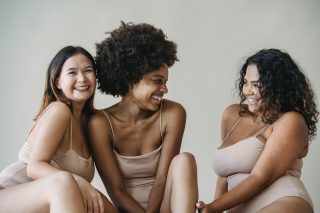2020 was definitely a year that changed our perspectives on a lot of things. It was also a year that many people broadened their thinking. They learned to be more conscious of other people’s experiences outside their immediate reality. As a result, the idea of representation became a trending topic of conversation. This eventually led to the rise of body positivity. Many brands and individuals all over the world are looking to be more inclusive.
That said, a recent study from Reebok found that when it comes to body positivity, the UK is leading the charge, whereas countries such as South Africa and India are unfortunately lagging behind.
What is body positivity?
“Body positivity is a movement which rejects the implication that any size is more appealing than another and has recently evoked strong emotions around the way brands market to women in particular,” explains Jenna Rigby, a Body Transformation Coach. She adds that there is “increased pressure in the fitness industry as a whole to prove inclusivity to people of all sizes.”

Photo by Antonius Ferret from Pexels
For the study, the researchers looked at how often terms like ‘body confidence’, ‘body positive’, ‘plus size’ and more appeared in the news and were searched online around the world. After the UK, the United States came in second place, followed by Ireland in terms of the most media coverage about body inclusivity.
India was found to be the least body-positive country, followed by South Africa.
Why is body positivity important?
“A 2019 study carried out by the Mental Health Foundation (MHF) showed that poor body image affects all ages and genders, leading to one-third of adults feeling anxious or depressed, and one in eight having suicidal thoughts,” explains Melissa Howard, the founder of The Confidence Academy.
What affects it?
Social media
Social media produces a great amount of pressure to look a certain way. Individuals often feel as though they must look a certain way in order to feel accepted on these platforms.
Unrealistic Beauty Standards

Photo by Anete Lusina from Pexels
The rise of social media has produced a range of unrealistic beauty standards. Pictures on these platforms are often extremely edited and enhanced, producing unattainable beauty standards.
Diet culture
Diet culture and the rise of “fad” diets lead individuals to believe they are less worthy based on their appearance.
Cultural differences
Different body and beauty standards are held across the world. These unrealistic body images can often affect body positivity as the beauty standard is not inclusive of all shapes and sizes.
Perfectionism
The media has contributed to an unattainable ideal of perfection. Thus not conforming to this standard can often affect body positivity and self-acceptance.
Does body positivity encourage poor health habits?
Some critics may voice their concerns about how body positivity may encourage poor health habits. However, that couldn’t be further from the truth. For instance, a 2019 study published in the Canadian Medical Association Journal found that fat-shaming actually leads to increased weight gain as well as depression, anxiety, low self-esteem, eating disorders, and exercise avoidance.

Photo by Online Marketing on Unsplash
“What is needed is for GPs to receive better training in how to approach the topic of weight during consultations so that they can better help patients who want to lose weight to do so without feeling personally targeted or shamed.” writes Tanisha Jemma Rose Spratt, a postdoctoral researcher in the Nuffield Department of Primary Care Health Sciences, University of Oxford.
How can I be more body positive?
Quit the judgment
This is a great way to be more positive to others around you in general. It’s also fundamental for the acceptance and inclusivity of people of all shapes and sizes.
Remove social pressure
We need to reduce the unrealistic extremities of what people feel they need to reach in order to ‘be happy’.
Change your perspective

Photo by AllGo – An App For Plus Size People on Unsplash
You should try letting go of old ideas. Try creating the conviction that beauty, perhaps even perfection, comes in many shapes, as well as sizes, and forms. Doing so will help us be happier with ourselves and more accepting of others.
Get more involved
You can follow more diverse people and body inclusivity activists on social media platforms. Broaden your horizons and show some love.
Want to know more?
We all use social media now and then, but do we sometimes use it to run from our problems? Tom Bivins is the head of ergonomics and wellbeing at Vita Health Group. He addresses the late-night use of social media as an emotional avoidance tactic.
References
Vogel L. (2019). Fat shaming is making people sicker and heavier. CMAJ : Canadian Medical Association journal = journal de l’Association medicale canadienne, 191(23), E649. https://doi.org/10.1503/cmaj.109-5758



![women [longevity live]](https://longevitylive.com/wp-content/uploads/2020/01/photo-of-women-walking-down-the-street-1116984-100x100.jpg)










